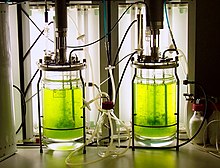
A moss bioreactor is a photobioreactor used for the cultivation and propagation of mosses. It is usually used in molecular farming for the production of recombinant protein using transgenic moss. In environmental science moss bioreactors are used to multiply peat mosses e.g. by the Mossclone consortium to monitor air pollution.[citation needed]
Moss is a very frugal photoautotrophic organism that has been kept in vitro for research purposes since the beginning of the 20th century.[1]
The first moss bioreactors for the model organism Physcomitrella patens were developed in the 1990s to comply with the safety standards regarding the handling of genetically modified organisms and to gain sufficient biomass for experimental purposes.[2]
- ^ Hohe, A.; Reski, R. (2005). "From axenic spore germination to molecular farming: one century of bryophyte in vitro culture". Plant Cell Reports. 23 (8): 513–521. doi:10.1007/s00299-004-0894-8. PMID 15558285.
- ^ Reutter, K.; Reski, R. (September 1996). "Production of a heterologous protein in bioreactor cultures of fully differentiated moss plants" (PDF). Plant Tissue Culture and Biotechnology. 2 (3): 142–147. Archived from the original (PDF) on 2011-10-04.